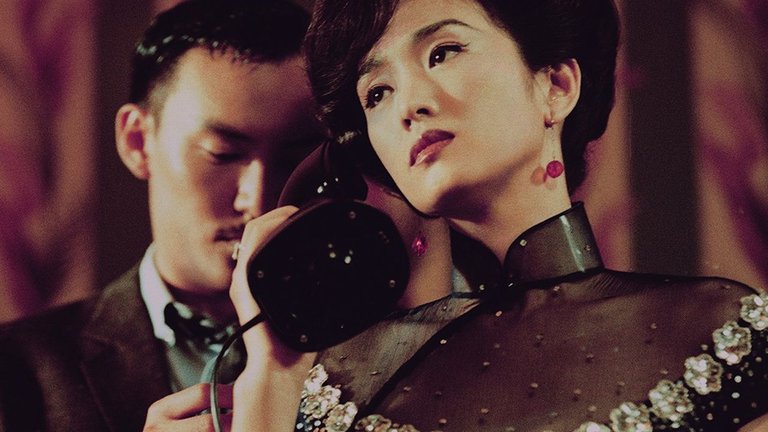
During the week I published reviews of two animated short films, thinking that it's not always necessary to have two or three hours to watch a high-quality film. However, I didn't want to leave you with the impression that there are only animated shorts of fifteen minutes or less, because the truth is that there are a great number of short or medium-length works that are worth checking out.
Durante la semana publiqué las reseñas de dos cortometrajes animados, pensando en que no siempre es necesario disponer de dos o tres horas para ver un producto cinematográfico de gran calidad. Sin embargo, no quería dejarles la impresión de que solamente existen los cortos animados de quince minutos o menos, porque la verdad es que existe una gran cantidad de obras de poca o mediana duración que vale la pena revisar.
To exemplify the richness and variety of this genre, I want to leave you with three recommendations that I've seen on Mubi, two of which I already reviewed on this platform in recent months, Tuesday by Charlotte Wells (director of Aftersun) and La Jetée by Chris Marker (the seed of what later became 12 Monkeys); and the third one's the one I saw recently and that reunited me with one of my favorite film directors: Wong Kar-Wai. The first thing I should say about The Hand is that it was originally part of a three-segment anthology film called Eros (Steven Soderbergh and Michelangelo Antonioni directed the other two stories), but this version I saw, enlarged, is wonderful in its own right because it has all the charm of the works that made Wong Kar-Wai one of the most acclaimed directors of his time. From the beginning we notice the director's stamp, the photography, the colorful sets, the contrast of elegance and decadence, the Hong Kong of the sixties, the dialogues of the characters, the glances, and that contained love story between two characters who, as in other films by his director (In the Mood for Love, 2046) cannot love each other or cannot be together. Whether they arrive late, or very early, whether they love whom they should not or whom they are not reciprocated by, Wong Kar-Wai's characters are usually unhappy.
Para ejemplificar la riqueza y la variedad de este género les quiero dejar tres recomendaciones que he visto en Mubi, dos que ya reseñé en esta plataforma en meses pasados, Tuesday de Charlotte Wells (directora de Aftersun) y La Jetée de Chris Marker (la semilla de lo que luego fue 12 Monkeys); y el tercero es uno que vi recientemente y que me reencontró con uno de mis directores de cine favoritos: Wong Kar-Wai. Lo primero que debo decir sobre The Hand es que originalmente formó parte de una película antológica de tres segmentos llamada Eros (Steven Soderbergh y Michelangelo Antonioni dirigieron las otras dos historias), pero esta versión que vi, aumentada, es maravillosa por sí sola porque tiene todo el encanto de los trabajos que convirtieron a Wong Kar-Wai en uno de los directores más aclamados de su tiempo. Desde el inicio notamos el sello del director, la fotografía, el colorido de los decorados, el contraste de la elegancia y la decadencia, el Hong Kong de los años sesenta, los diálogos de los personajes, las miradas, y esa historia de amor contenida entre dos personajes que, como en otras películas de su director (In the Mood for Love, 2046) no pueden amarse o no pueden estar juntos. Ya sea que lleguen tarde, o muy temprano, que amen a quien no deben o a quien no les corresponde, los personajes de Wong Kar-Wai suelen ser desdichados.

But they are also very romantic, and Miss Hua and Zhang are no exception. She's a prostitute who takes care of clients who call her on the phone, and he's the tailor's apprentice who makes Miss Hua's clothes, and one day he's entrusted with the task of visiting her to take her measurements. The age difference between the two is not clear, but whether it's due to experience, age, or authority, Miss Hua takes advantage of young Zhang and from then on he's infatuated with her.
Pero también suelen ser muy románticos y ni la srta. Hua ni Zhang son la excepción. Ella es una prostituta que atiende a los clientes que la llaman por teléfono y él es el aprendiz del sastre que le hace la ropa a la srta. Hua a quien un día le encomiendan la tarea de ir a visitarla para tomarle las medidas. No queda clara la diferencia de edad entre ambos, pero ya sea por un tema de experiencia, de edad, o de autoridad, la srta. Hua se aprovecha del joven Zhang y desde entonces él queda prendido de ella.
The story is almost circular. It begins with an encounter between Zhang and a woman we don't see (who will later be revealed to us as Miss Hua) and then goes back in time to narrate the events that have brought him to that hotel room. In just under an hour (this version lasts 56 minutes) we witness, on the one hand, the difficult life of Miss Hua who dreams again and again of being able to make a life for herself elsewhere, looking for an opportunity to leave the life she leads but cannot leave, in part, because she's in love with a gigolo who doesn't treat her well; and on the other hand, we see how Zhang goes from apprentice to tailor and how he begins to become the prostitute's only friend, doing for her what no one else does without sharing or getting from her what everyone else gets. Even though she's somewhat abrupt with him and doesn't treat him in the best way, he treats her almost with devotion and there's an important romantic element that gives a new dimension to a relationship whose main component is not sex, but eroticism. Other stories by Wong Kar-Wai have erotic elements and sexual scenes (I think of Happy Together or Days of Being Wild), but I don't think that in any other of his works is eroticism handled in such an explicit and at the same time so concealed way. That is to say, the erotic is direct, but also subtle. It's not about being graphic and showing, but suggesting. It's not about the body, but about the hands.
La historia es casi circular. Comienza con un encuentro entre Zhang y una mujer a quien no vemos (que después se nos revelará como la srta. Hua) y de allí se va atrás en el tiempo para narrar los hechos que lo han traído a esa habitación de hotel. En poco menos de una hora (esta versión dura 56 minutos) somos testigos, por un lado, de la difícil vida de la srta. Hua que una y otra vez sueña con poder hacer su vida en otro lugar, buscando una oportunidad para abandonar la vida que lleva pero que no puede dejar, en parte, porque está namorada de un gigoló que no la trata bien; y por otro lado, vemos cómo Zhang pasa de aprendiz a sastre y cómo comienza a convertirse en el único amigo de la prostituta, haciendo por ella lo que nadie más hace sin compartir ni obtener de ella lo que todos los demás obtienen. A pesar de que ella es algo cortante con él y de que no lo trata de la mejor manera, él la trata casi con devoción y hay un elemento romántico importante que le da una nueva dimensión a una relación cuyo principal componente no es el sexo, sino el erotismo. Otras historias de Wong Kar-Wai tienen elementos eróticos y escenas sexuales (pienso en Happy Together o Days of Being Wild), pero creo que en ninguna otra de sus obras se maneja el erotismo de una forma tan explícita y a la vez tan disimulada. Es decir, lo erótico es directo, pero también sutil. No se trata de ser gráficos y mostrar, sino sugerir. No se trata del cuerpo, sino de las manos.

The whole film is very sensual and hands play a leading role. Hers when she caresses him at their first meeting and doesn't let go of him during all the years they shared, when she recalls common memories and when she protects her lips from his lips; and Zhang's hands when they caress her to measure her, when they slide softly over the fabric of her dresses and when he holds her in her bed before they say goodbye.
Toda la película es muy sensual y las manos juegan un papel protagonista. Las de ella cuando lo acaricia en su primer encuentro para no soltarlo durante todos los años que compartieron, cuando evoca recuerdos en común y cuando protege sus labios de los labios de él; y las manos de Zhang cuando la acarician para medirla, cuando se deslizan suavemente sobre la tela de sus vestidos y cuando la sostienen en su lecho antes de la despedida.
Wong Kar-Wai's films are tremendously visual. Colours, rooms, lights and shadows play a decisive role in telling a story, not only from what they can reveal about the plot (a notice on a wall, an object forgotten on a table) but from what they can make us feel. Loneliness, emptiness, pain, sadness, company, love, hope, are emotions that can be perceived through the photography of the films of this Hong Kong director. Added to that we have a script that is as rich in words as in silences. What the characters say, those few lines of dialogue, is complemented by what they keep quiet, by what they do, by the way they look at each other or caress an object. Everything that happens is helping to tell the story. The Hand is an erotic, romantic, very sexy story, a condensed example of Wong Kar-Wai's talent and the confirmation that two or three hours are not needed to tell a good story. In recent years we have seen how longer and longer films have gained ground. 120, 150, 180 minutes and more can represent a great experience in movie theaters (depending on the film) but can be an obstacle to watching something at home in the middle of our routine. And for those moments when we want to see something, but we don't have much time, short films are ideal, stories of 60 minutes or less that can be as good - even better - than longer formats. What short film do you remember having seen that you liked? Have you seen The Hand? I'll read you in the comments.
El cine de Wong Kar-Wai es tremendamente visual. Los colores, las habitaciones, las luces, las sombras, juegan un papel determinante a la hora de contarnos una historia, no sólo desde lo que pueden revelar de la trama (un aviso en una pared, un objeto olvidado sobre la mesa) sino de lo que nos pueden hacer sentir. Soledad, vacío, dolor, tristeza, compañía, amor, esperanza, son emociones que pueden percibirse a través de la fotografía de las películas de este director hongkonés. Sumado a eso tenemos un guión que es tan rico en palabras como en silencios. Lo que los personajes dicen, esas pocas líneas de diálogo, se complementa con lo que callan, con lo que hacen, con la forma en que se miran o en que acarician un objeto. Todo lo que ocurre está ayudando a contar la historia. The Hand es una historia erótica, romántica, muy sexy, una muestra condensada del talento de Wong Kar-Wai y la confirmación de que no se necesitan dos o tres horas para contar una buena historia. En los últimos años hemos visto cómo han ganado terreno las películas cada vez más extensas, 120, 150, 180 minutos y más pueden representar una gran experiencia en las salas de cine (dependiendo de la película) pero puede ser un obstáculo para ver algo en casa en medio de nuestra jornada. Y para esos momentos en que queremos ver algo, pero no tenemos mucho tiempo, son ideales los cortometrajes, historias de 60 minutos o menos que pueden ser tan buenos - incluso mejores - como los formatos más largos, ¿qué cortometraje recuerdan haber visto que les haya gustado? ¿han visto The Hand? Los leo en los comentarios.
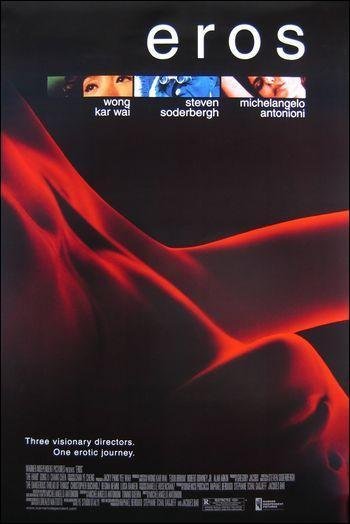
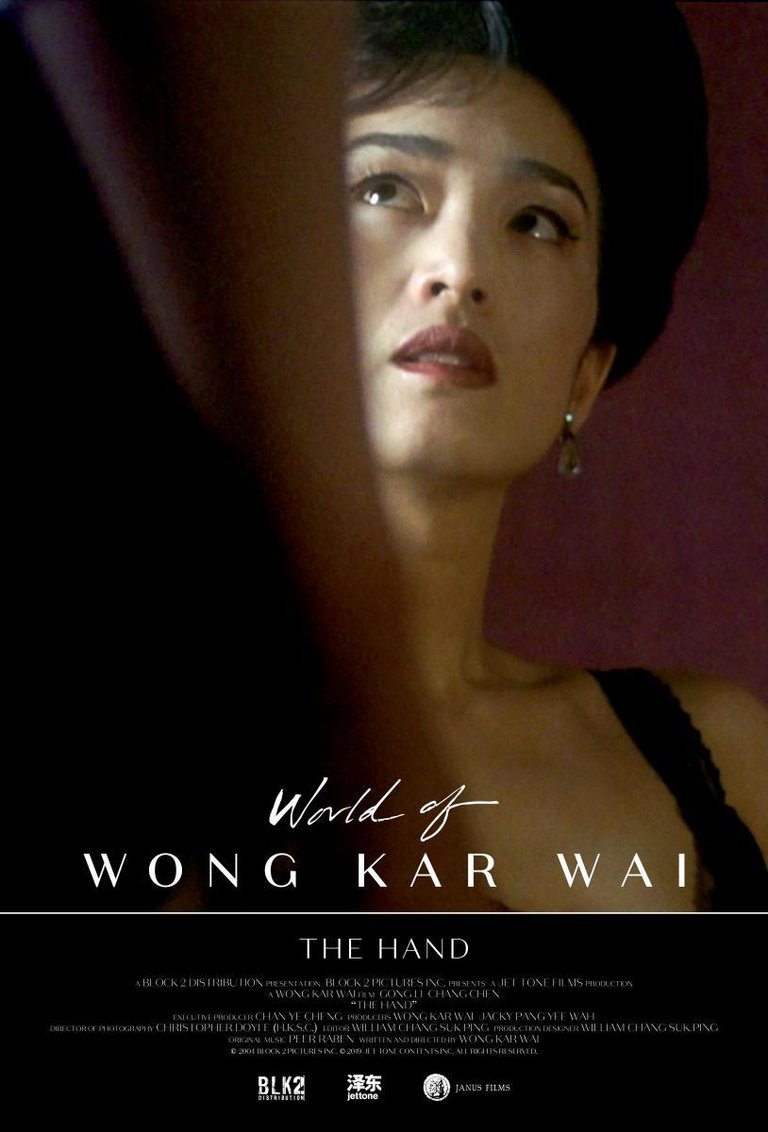
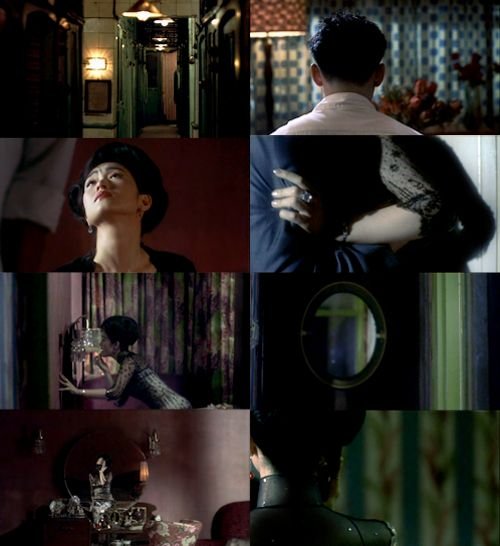
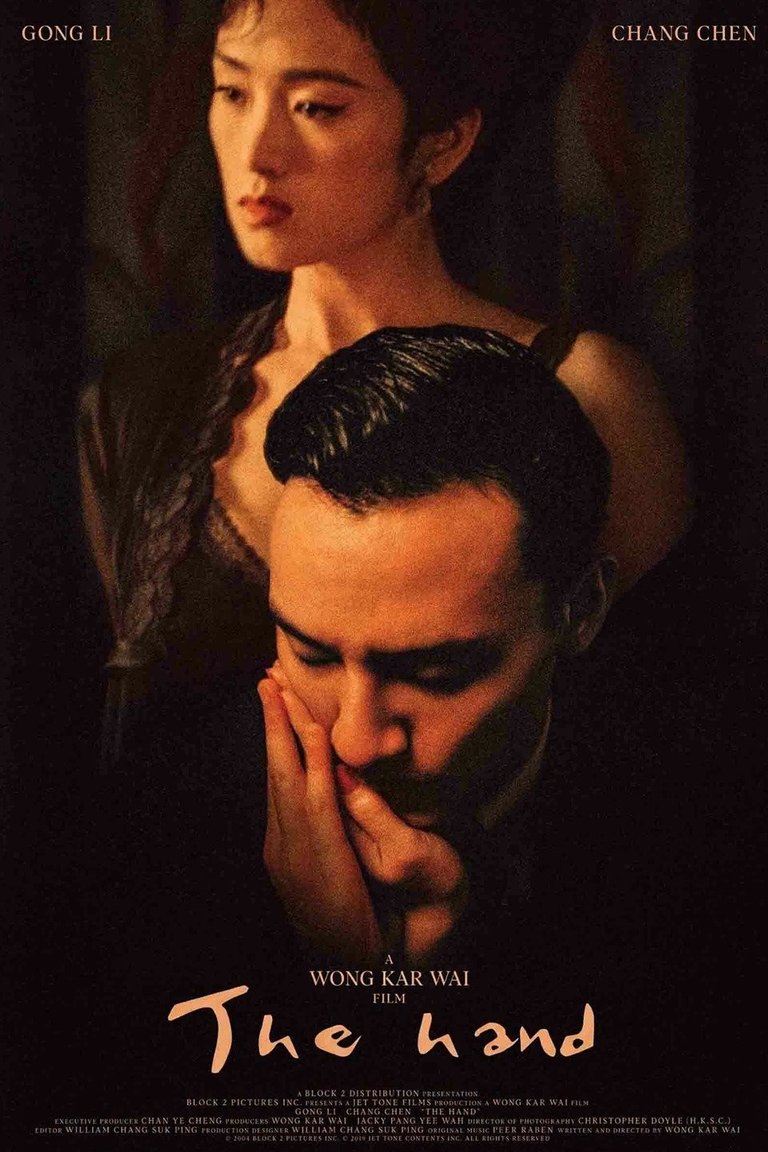

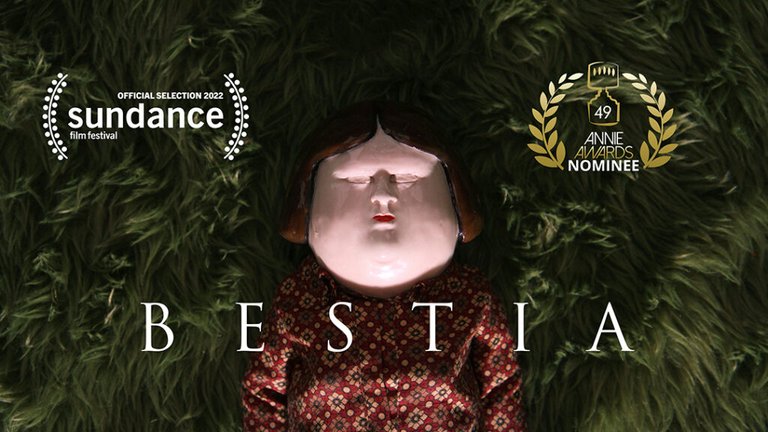

¡Felicidades! Esta publicación obtuvo upvote y fue compartido por @la-colmena, un proyecto de Curación Manual para la comunidad hispana de Hive que cuenta con el respaldo de @curie.
Si te gusta el trabajo que hacemos, te invitamos a darle tu voto a este comentario y a votar como testigo por La Colmena.
Si quieres saber más sobre nuestro proyecto, te invitamos a acompañarnos en nuestro servidor de Discord.
Muchas gracias por el apoyo. Saludos.